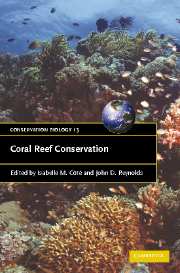Book contents
- Frontmatter
- Contents
- List of contributors
- Foreword
- Preface
- Part I Setting the stage
- Part II Uses and abuses: ecological and socio-economic issues
- Part III The way forward: tools and approache
- 9 New approaches to estimating recent ecological changes on coral reefs
- 10 Assessing the effectiveness of marine protected areas as a tool for improving coral reef management
- 11 Environmental impact assessment for coral reefs: advocating direct protective approaches
- 12 Time for a third-generation economics-based approach to coral management
- 13 Collaborative and community-based conservation of coral reefs, with reference to marine reserves in the Philippines
- 14 Education as a tool for coral reef conservation: lessons from marine protected areas
- 15 Adaptive institutions for coral reef conservation
- 16 Coral reef restoration with case studies from Florida
- 17 Redesigning coral reef conservation
- 18 Coral reef coda: what can we hope for?
- Index
- Plate section
- References
12 - Time for a third-generation economics-based approach to coral management
Published online by Cambridge University Press: 05 June 2012
- Frontmatter
- Contents
- List of contributors
- Foreword
- Preface
- Part I Setting the stage
- Part II Uses and abuses: ecological and socio-economic issues
- Part III The way forward: tools and approache
- 9 New approaches to estimating recent ecological changes on coral reefs
- 10 Assessing the effectiveness of marine protected areas as a tool for improving coral reef management
- 11 Environmental impact assessment for coral reefs: advocating direct protective approaches
- 12 Time for a third-generation economics-based approach to coral management
- 13 Collaborative and community-based conservation of coral reefs, with reference to marine reserves in the Philippines
- 14 Education as a tool for coral reef conservation: lessons from marine protected areas
- 15 Adaptive institutions for coral reef conservation
- 16 Coral reef restoration with case studies from Florida
- 17 Redesigning coral reef conservation
- 18 Coral reef coda: what can we hope for?
- Index
- Plate section
- References
Summary
INTRODUCTION
This chapter conveys a simple but critical message. Coral reefs provide an immense yet still underestimated value to society. Benefits include, amongst other things: food, recreation, education, health, coastal protection, support of other ecosystems and species, and enjoyment from social, cultural and spiritual aspects, as well as income generation and livelihood support (see Spurgeon, 1992; Moberg and Folke, 1999; Cesar, 2002; Whittingham et al., 2003; Ahmed et al., 2004). Regrettably though, corals are in serious decline and efforts to manage and protect them are generally inadequate and significantly under-resourced in terms of money and management skills.
In recent years economic approaches have been recognized as potentially providing powerful underpinning support for effective coral reef protection. However, given the continuous decline in status of corals (Wilkinson, 2004; Wilkinson, this volume) and the current unprecedented dynamic nature of the global economy, it is time for an updated economics-based approach. The approach needs to be more effective in demonstrating the benefits from enhancing coral management and protection, and should facilitate the maximization of potential long-term benefits derived from healthy coral reefs. To achieve this we need to broaden the issues explored, go well beyond just ‘knowing’ the ‘numbers’, and embrace a far more integrated and radical ‘third-generation’ economics-based approach.
Aim and contents
An introduction to coral reef economics and a fairly comprehensive set of different coral reef values can be found elsewhere (e.g. Spurgeon, 1992; Cesar, 2002; Ahmed et al., 2004).
- Type
- Chapter
- Information
- Coral Reef Conservation , pp. 362 - 391Publisher: Cambridge University PressPrint publication year: 2006

